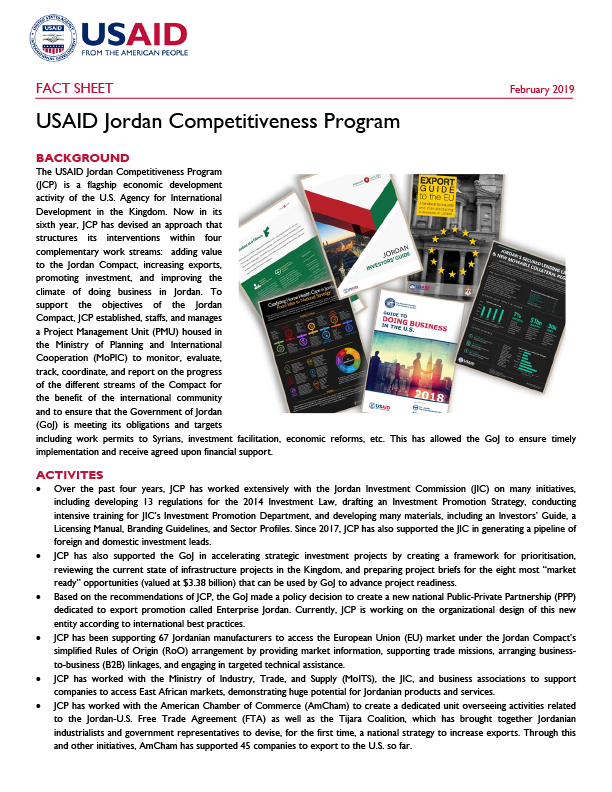Speeches Shim

BACKGROUND
The USAID Jordan Competitiveness Program (JCP) is a flagship economic development activity of the U.S. Agency for International Development in the Kingdom. Now in its sixth year, JCP has devised an approach that structures its interventions within four complementary work streams: adding value to the Jordan Compact, increasing exports, promoting investment, and improving the climate of doing business in Jordan. To support the objectives of the Jordan Compact, JCP established, staffs, and manages a Project Management Unit (PMU) housed in the Ministry of Planning and International Cooperation (MoPIC) to monitor, evaluate, track, coordinate, and report on the progress of the different streams of the Compact for the benefit of the international community and to ensure that the Government of Jordan (GoJ) is meeting its obligations and targets including work permits to Syrians, investment facilitation, economic reforms, etc. This has allowed the GoJ to ensure timely implementation and receive agreed upon financial support.
ACTIVITES
USAID Jordan Competitiveness Program ![]() (pdf - 180k)
(pdf - 180k)
- Over the past four years, JCP has worked extensively with the Jordan Investment Commission (JIC) on many initiatives, including developing 13 regulations for the 2014 Investment Law, drafting an Investment Promotion Strategy, conducting intensive training for JIC’s Investment Promotion Department, and developing many materials, including an Investors’ Guide, a Licensing Manual, Branding Guidelines, and Sector Profiles. Since 2017, JCP has also supported the JIC in generating a pipeline of foreign and domestic investment leads.
- JCP has also supported the GoJ in accelerating strategic investment projects by creating a framework for prioritisation, reviewing the current state of infrastructure projects in the Kingdom, and preparing project briefs for the eight most “market ready” opportunities (valued at $3.38 billion) that can be used by GoJ to advance project readiness.
- Based on the recommendations of JCP, the GoJ made a policy decision to create a new national Public-Private Partnership (PPP) dedicated to export promotion called Enterprise Jordan. Currently, JCP is working on the organizational design of this new entity according to international best practices.
- JCP has been supporting 67 Jordanian manufacturers to access the European Union (EU) market under the Jordan Compact’s simplified Rules of Origin (RoO) arrangement by providing market information, supporting trade missions, arranging businessto-business (B2B) linkages, and engaging in targeted technical assistance.
- JCP has worked with the Ministry of Industry, Trade, and Supply (MoITS), the JIC, and business associations to support companies to access East African markets, demonstrating huge potential for Jordanian products and services.
- JCP has worked with the American Chamber of Commerce (AmCham) to create a dedicated unit overseeing activities related to the Jordan-U.S. Free Trade Agreement (FTA) as well as the Tijara Coalition, which has brought together Jordanian industrialists and government representatives to devise, for the first time, a national strategy to increase exports. Through this and other initiatives, AmCham has supported 45 companies to export to the U.S. so far.
- Regionally, JCP worked with the Private Hospital Association (PHA) to market Jordan as a medical tourism destination, especially in new markets. As a result, the number of foreign patients from key markets like Algeria, Chad, Kazakhstan, Oman, and Saudi Arabia tripled from under1000 patients in 2016 to almost 7655 in 2018.
IMPACT
- Advising the Companies Control Department (CCD) at MoITS, JCP helped develop new regulations that will allow the establishment of Venture Capital (VC) funds in Jordan. The VC Regulations have been enacted and published in the official gazette.
- Working with the MoITS to implement an online Moveable Collateral Registry and provide training to ministry staff on the system. Combined with the recent Secured Lending law, the online registry allows banks to lend to small and medium-sized enterprises (SMEs) using their movable assets (equipment, inventory, receivables, etc.) as collateral. It is estimated that banks' lending to SMEs will increase by seven percent annually, representing a more than $1 billion per year increase in available financing and translating into approximately 30,000 jobs over four years.
- Supporting Jordan in joining the Patent Cooperation Treaty (PCT) and fully automating all patent and trademark registration at MoITS, including through new e-submission, e-filing, and e-payment functionality, thereby increasing Jordan’s competitiveness in Intellectual Property (IP) rights protection and increasing the number of patents registered.
- Supporting the Jordan Food and Drug Administration (JFDA) in streamlining and fully automating the drug registration process in Jordan to reduce pharmaceutical product time-to-market from over two years to just over one year, thus increasing the competitiveness of Jordanian pharmaceutical companies exporting to regional markets.
- Supporting the Ministry of Energy and the Energy and Mineral Resources Commission (EMRC) to develop key regulations and processes critical to the Renewable Energy market, including regulations for megawatt renewable energy wheeling and pooling projects, direct proposals for Independent Power Producers (IPPs), and electric vehicle charging stations licensing.
- Supporting the GoJ in removing export subsidies that were a violation of World Trade Organization (WTO) requirements. The new scheme, approved by the government, used the surplus in revenue to provide income tax exemptions for manufacturers in place of tax exemptions on exports.
- Developing Jordan’s REACH 2025 strategy and action plan for digitizing the Jordanian economy.
JCP has also supported several activities related to youth engagement and entrepreneurship, including:
- Supporting innovative start-ups via acceleration and incubation programs such as Oasis500 and iPARK. Over 100 start-up companies were supported through these programs.
- Working with Education for Employment- Jordan (EFE Jordan) to place almost 650 recent graduates in jobs.
- Assisting the King Abdullah II Fund for Development to upgrade the career guidance offices at 3 Jordanian universities.
- Partnering with major multinational corporations such as Intel and Microsoft to provide training on the latest emerging technologies, including the Internet of Things (IoT), cloud computing, and 3D printing.


Comment
Make a general inquiry or suggest an improvement.